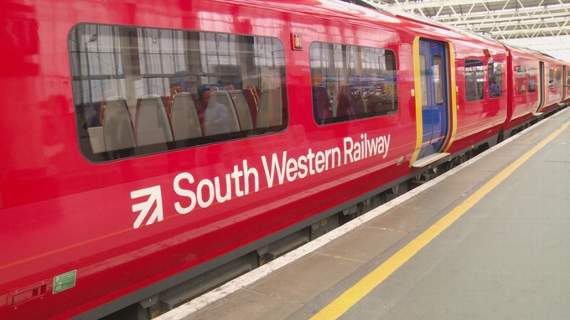THE total number of passenger journeys on South Western Railway has plummeted by a UK-high eight-and-a-half per cent, as passenger groups warn that fare rises and industrial disputes are driving commuters off the rails.
The latest quarterly figures released by the Office of Rail and Road reveal SWR, which operates the Alton to Waterloo line, recorded 4.8 million fewer passenger journeys across its network between July and September 2017 compared with the same quarter the previous year.
This was mainly due to the three-week engineering works at London Waterloo in August, with the shift in the franchise ownership from Stagecoach to First Group/MTR also partly to blame, acording to the Department for Transport.
However, as South Western Railway commuters were confronted by average 3.3 per cent fare hikes on their return to work on Tuesday, and with yet more strike action to follow next week, the Campaign for Better Transport said it was becoming evident that rail passengers are “voting with their feet”.
Stephen Joseph, chief executive of the Campaign for Better Transport, said: “Rail commuters are fed up with being used as cash cows for government coffers. This year’s rise is the highest for five years, at a time when wages aren’t increasing, and there’ll be real anger on the trains about this.
“But also there are signs that commuters are just voting with their feet and simply changing their work or homes to avoid the ever more expensive daily commute.”
Rail fares increased by an average 3.3 per cent across the South Western Railway network on January 2, against a national average of 3.4 per cent - the biggest hike since 2013.
However, Alton commuters have been punished more than most, with the price of a 12-month standard class adult season ticket (not including a Travelcard) increasing by an above-average 3.5 per cent, from £4,060 to £4,204, and a peak-time Anytime Day Travelcard from Alton to London (zones one to six) increasing 4.9 per cent to £50.
By comparison, the latest figures from the Office for National Statistics show average weekly earnings fell 0.2 per cent in the autumn compared with the previous quarter, once inflation was factored in, confirming a squeeze on living standards.
This prompted the Alton Line Users’ Association (ALUA) to denounce the increases as “unfair” in December, berating the use of July’s Retail Price Index and not the lower Consumer Price Index in setting the figure.
In a statement, ALUA said it can “only assume the Government is not using its preferred measure of inflation the Consumer Price Index, which is the one used to determine wages and pension increases, because it is often lower than Retail Price Index and would lead to smaller fare increases.”
It added: “Why not use the Consumer Price Index for rail fares too? Passengers deserve to be treated fairly. Salaries and wages over recent years have diminished by seven per cent in real terms, whilst rail fares have been continually rising.”
The fare rises also come on the back of strikes by South Western Railway workers on November 8, November 9 and New Year’s Eve, the latter disrupting passenger’s New Year celebrations, and ahead of further walkouts on January 8, January 10 and January 12 as part of a long-running dispute over the role of guards.
Addressing the latest round of industrial action this week, Andy Mellors, South Western Railway managing director, apologised for the disruption and hit out at the RMT rail union for targeting passengers wishing to celebrate the New Year with friends and family.
He said: “The last few months have been challenging with industrial action and poor performance making life difficult for everyone.
“Once again, our contingency guards will be on hand to ensure we keep you moving, although as these are working days and trains are likely to be busier than usual, we would encourage you to flex your journey and travel outside of the busy peak periods.
“None of us wanted to be in this position, and we have given the RMT repeated assurances that we plan to keep the second person on all our trains.
“Despite these reassurances, the RMT executive seems determined not to listen and is pressing ahead with these damaging strikes.”
RMT general secretary Mick Cash said: “Every single effort the RMT has made to reach negotiated settlements in these separate disputes with the different train operating companies over safe operation and safe staffing has been kicked back in our faces and we are left with no option but to confirm a further phase of industrial action in the New Year.
“No one should be in any doubt, these disputes are about putting the safety of the travelling public before the profits of the private train companies.
“It is frankly ludicrous we have been able to negotiate long-term arrangements in Scotland and Wales that protect the guards and passenger safety but we are being denied the same opportunities with rail companies in England.”
Along with those on Northern, Merseyrail and Greater Anglia, South Western Railway and Island Line, union members have been instructed not to book for any shifts between 12.01am and 11.59pm on January 8, January 10 and January 12.




